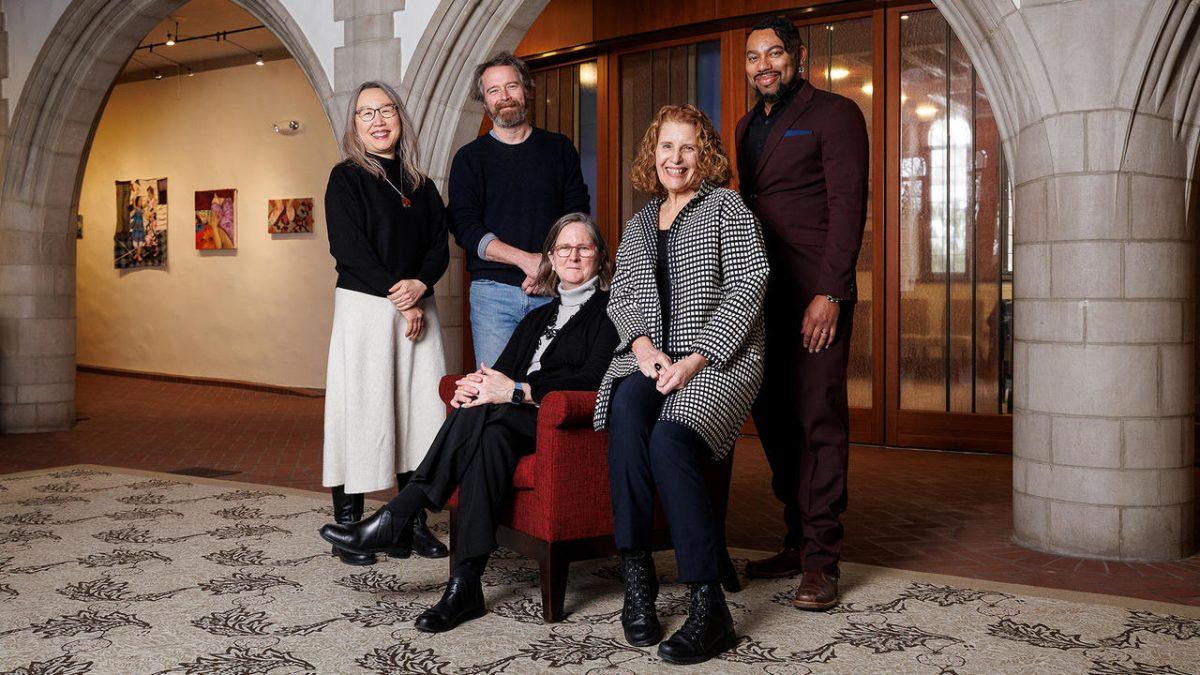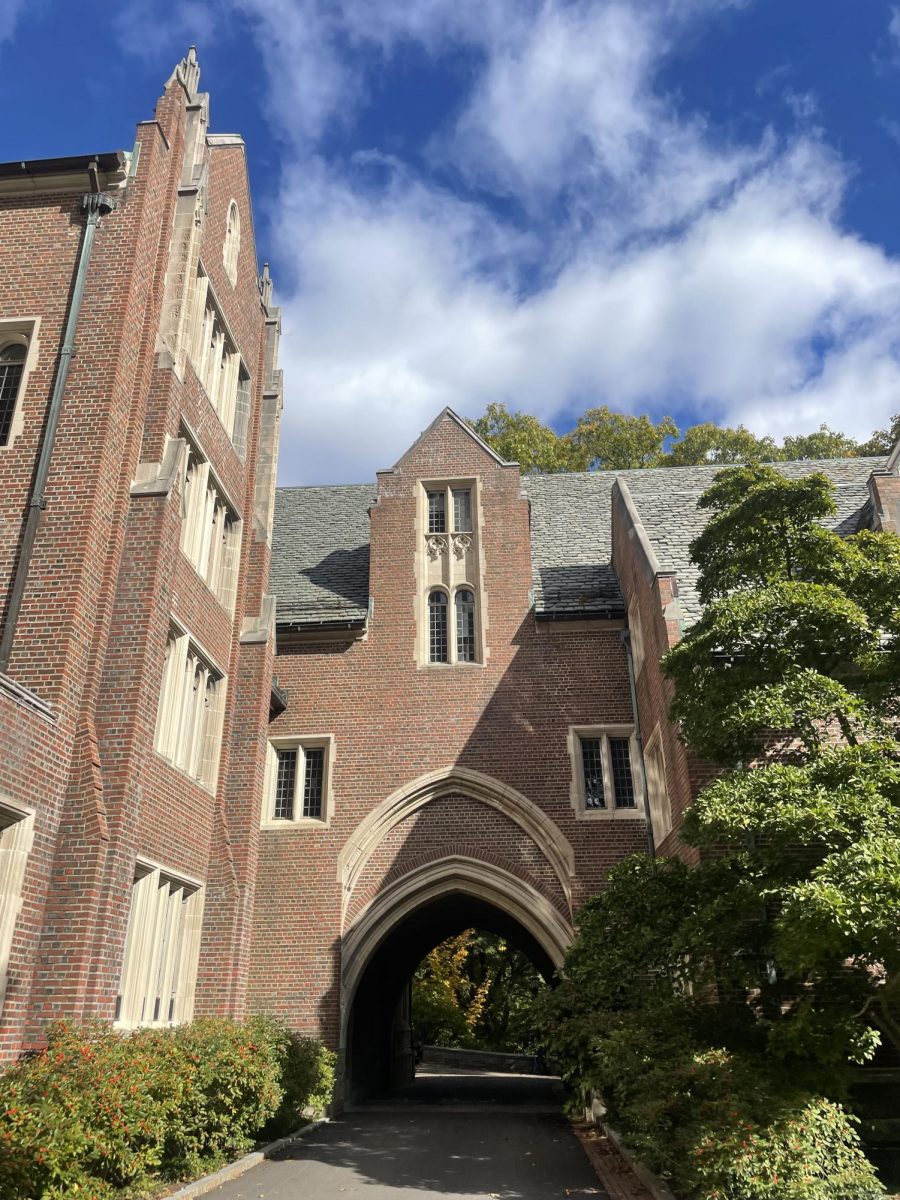Wellesley Humanities faculty recently received one of the biggest grants in the College’s history from the Mellon Foundation, the largest funder of arts and humanities in the United States. The Mellon Foundation has granted five of the College’s Humanities faculty members, Yoon Sun Lee, Eve Zimmerman, Cord Whittaker, Martha McNamara and Dan Chiasson, $1.5 million to be used over the next three and a half years.
Initially, the professors had submitted individual proposals to the Foundation but were rejected for funding. However, Jennifer Banks, director of the Office of Corporate and Foundation Relations, who worked closely with Wellesley faculty members in the grant application process, recognized an opportunity to weave these separate applications into a cohesive project.
She explained that there was a common thread that could unify the professors’ efforts, “I felt like they were all speaking to the impact that narrative can have on how we see ourselves and how we see others in different ways.”
After Banks asked the professors to meet and discuss their proposals, “They found the right path for themselves,” she said.
Professor Yoon Sun Lee, Chair of the English department and Anne Pierce Rogers professor of English, spearheaded the collaboration effort. She explained that the team started meeting in the spring of 2023 and met throughout the spring and summer every other week.
“It took many meetings and many hours,” she said.
Lee described some of the major questions and themes that grounded the conversation during the drafting process.
“The idea is that we want to really think about the specific kinds of questions that people in the humanities ask: what kinds of objects do we study? How do we study them? How can we bring our specific skills and interests and concepts to bear on these kinds of questions like identity and environment,” she said.
This grant was given as a part of the Mellon Foundation’s “Humanities for All Times” initiative which is designed to support new humanities curricula that teach future leaders how humanities practices contribute to social justice efforts. In alignment with this initiative, Dan Chiasson, Lorraine C. Wang professor of English, shared a perspective on redefining the humanities’ role at Wellesley College.
“[The humanities are] not asked questions so much about structures of inclusion and exclusion, as much as say, a political scientist or a sociologist would be. But humanities methods — storytelling, metaphor making, image making — those are all human practices that have a lot to say to big social, civic, political questions. So, I think it could reset the humanities at Wellesley as a place to go for valid, innovative answers to questions that have sometimes tended to land in the laps of the sociologists or the political scientists, or even folks in STEM.”
The grant funds will be used in three distinct areas: curriculum development, student research and public humanities projects. The grant proposal plans for 30-40 new or revised classes and nearly 200 students involved in paid research. Banks elaborated on the nature of the new and revised courses, noting that “they are going to be … aligned with areas of social justice, democracy, climate, justice and identity in some way.”
Lee explained that the funds will specifically cover things including stipends for student internships in the summer, student researchers, workshops with outside speakers, stipends for faculty participating in the grant’s projects, and the humanities hub in Clapp. She specifies that the faculty will also be hiring a full-time administrator to assist with implementing the grant project.
Professor Martha McNamara, director of the New England Arts and Architecture Program and senior lecturer in the department of art, specified that the grant funds are not meant to hire more faculty.
“We weren’t looking for staffing, but rather we said we have all of these people — resources — here doing amazing work, they just need a lift,” she said.
Each semester, a smaller cohort of faculty members will assemble to discuss upcoming grant projects.
“Each one is going to be like the engine that drives the changes that we hope to see happen across the humanities,” Lee explained.
55 humanities faculty members (40%) have already said that they would be a part of this group, which will change each semester to maximize the grant’s impact across departments.
“That cohort that comes together each semester or year will do that kind of cross-pollination and discussion across disciplines … We expect that they’ll change — it’s going to be very fluid because we’re trying to reach all the disciplines across the humanities … We really want this to be a fundamental transformation,” McNamara said.
The spring 2024 semester is the initial planning stage for the grant.
“[We] see this semester as a planning semester to enable us to sort of hit the ground running in September of ’24,” McNamara said.
The first meeting of the faculty working group will be on Feb. 26. Lee explained that she hopes the group will be able to offer a certain number of new student internships this summer and new and revised courses available in the 2025-26 school year. The grant proposal states that one-third of the new or revised courses that utilize the grant’s major themes will be in courses open to non-humanities majors, an attempt at exposing as many students to the humanities as possible.
Lee is particularly excited about the student research part of the grant.
“Wellesley students, first-year students in particular, often ask about opportunities to do research. In the sciences, obviously, everything is already set up; there are labs and offices that help direct interested students to these opportunities. I think that students will find it really exciting and rewarding to learn more about what research in the humanities consists of and how they can also do it,” she said.
She also explained that one of the grant’s major focus areas is inclusion.
“We were especially interested in trying to make the humanities more inclusive and welcoming to students who might be coming from underrepresented backgrounds … We are aiming, through providing internships and research opportunities in the humanities, to help to transform students’ lives,” she said.
McNamara is excited about the grant’s potential to revitalize the humanities at Wellesley.
“When we think of liberal arts colleges, we think of them as really being grounded in the humanities, and I think that’s true, but as there’s been more and more of a clamor for STEM education, the attention has sort of shifted, it seems to me, much more towards STEM … and that’s not a bad thing, but this has been great to enable us to really highlight and foster humanities scholarship here at Wellesley,” she said.
“It’s so validating to have a foundation like Mellon give us such a tremendous amount of funding … it’s just such a vote of confidence,” McNamara said.




